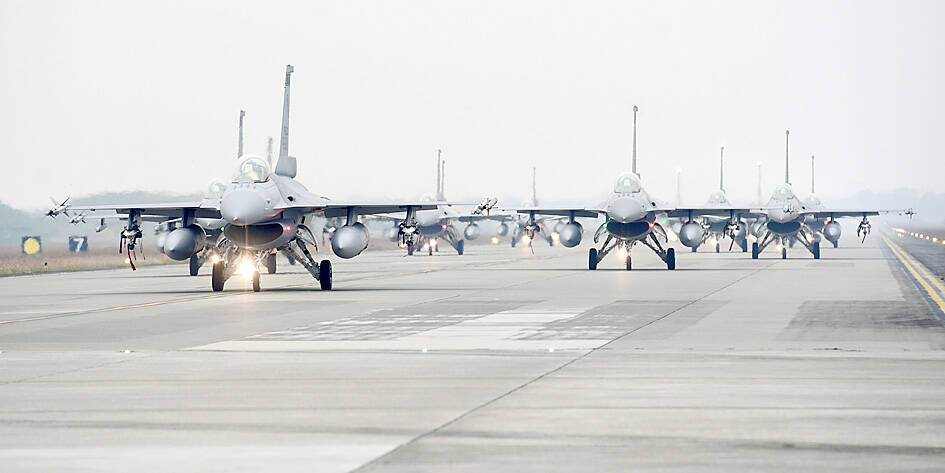Runways at seven airports are to be widened to make them more resilient to a potential missile attack from China, a source from the Ministry of National Defense said yesterday.
Ministry officials and US advisers made the decision after reviewing data from Han Kuang military exercises, the source said, adding that runways would be widened to 60m.
The adjustment would allow runways to more quickly be repaired so that fighter jets could take off and land, and would make the runways usable by B-52 bombers and large transport aircraft, the source said.

Photo: Lo Pei-de, Taipei Times
In a combat scenario, China would likely target Taiwan’s air bases, so the ministry is preparing by widening runways and performing annual repair drills, the source said.
The runway of the Ching Chuan Kang (清泉崗) Air Base in Taichung, which was originally built with the assistance of the US military, is 60m wide, as it was built to accommodate B-52 bombers. It was decided that runways at Taiwan’s other bases, which are 45m to 50m in width, should be widened to match that of Ching Chuan Kang, the source said.
“If runways are hit by surface-to-surface missiles or other weapons during wartime, takeoff and landing operations might be paralyzed — so we need to be prepared for that,” the source said.
Assuming that a runway is struck by Chinese ballistic missiles with an accuracy of less than 50m and a destruction radius of 25m, six missiles would give China an 80 percent chance of destroying the runway, the source said.
Potentially, China could destroy a runway with two missiles fired in short succession at a target with a radius of 100m, the source said.
“It’s not guaranteed that China would hit its target, but we must be ready to restore a runway should it be hit, and widening runways is the best way to accomplish that,” the source said.
The main runways of air bases have shoulders and buffer zones about 7.5m to 15m in width, which could be quickly reinforced by widening them, the source said.
Air force personnel have undergone runway repair training in the US, as well as at Ching Chuan Kang, the source said.
“During the last drill, the army’s unexploded ordinance disposal team used 18kg of TNT to blast holes in the base’s taxiway, simulating an enemy attack,” the source said. “The blast created a 2m-deep hole with a radius of 20m that teams used for the drill, which involved removing foreign objects, laying fiberglass repair kits, backfilling the crater and compacting it.”
During the drill, a minimum operating strip with a length of 1.5km and a width of 15m was opened to allow the resumption of aircraft takeoffs and landings in the shortest possible time, the source said.
Air force personnel have shortened runway repair times from four hours for one or large crater repair operations, down to 2.5 hours, the source said.

AIR SUPPORT: The Ministry of National Defense thanked the US for the delivery, adding that it was an indicator of the White House’s commitment to the Taiwan Relations Act Deputy Minister of National Defense Po Horng-huei (柏鴻輝) and Representative to the US Alexander Yui on Friday attended a delivery ceremony for the first of Taiwan’s long-awaited 66 F-16C/D Block 70 jets at a Lockheed Martin Corp factory in Greenville, South Carolina. “We are so proud to be the global home of the F-16 and to support Taiwan’s air defense capabilities,” US Representative William Timmons wrote on X, alongside a photograph of Taiwanese and US officials at the event. The F-16C/D Block 70 jets Taiwan ordered have the same capabilities as aircraft that had been upgraded to F-16Vs. The batch of Lockheed Martin

GRIDLOCK: The National Fire Agency’s Special Search and Rescue team is on standby to travel to the countries to help out with the rescue effort A powerful earthquake rocked Myanmar and neighboring Thailand yesterday, killing at least three people in Bangkok and burying dozens when a high-rise building under construction collapsed. Footage shared on social media from Myanmar’s second-largest city showed widespread destruction, raising fears that many were trapped under the rubble or killed. The magnitude 7.7 earthquake, with an epicenter near Mandalay in Myanmar, struck at midday and was followed by a strong magnitude 6.4 aftershock. The extent of death, injury and destruction — especially in Myanmar, which is embroiled in a civil war and where information is tightly controlled at the best of times —

Taiwan was ranked the fourth-safest country in the world with a score of 82.9, trailing only Andorra, the United Arab Emirates and Qatar in Numbeo’s Safety Index by Country report. Taiwan’s score improved by 0.1 points compared with last year’s mid-year report, which had Taiwan fourth with a score of 82.8. However, both scores were lower than in last year’s first review, when Taiwan scored 83.3, and are a long way from when Taiwan was named the second-safest country in the world in 2021, scoring 84.8. Taiwan ranked higher than Singapore in ninth with a score of 77.4 and Japan in 10th with

SECURITY RISK: If there is a conflict between China and Taiwan, ‘there would likely be significant consequences to global economic and security interests,’ it said China remains the top military and cyber threat to the US and continues to make progress on capabilities to seize Taiwan, a report by US intelligence agencies said on Tuesday. The report provides an overview of the “collective insights” of top US intelligence agencies about the security threats to the US posed by foreign nations and criminal organizations. In its Annual Threat Assessment, the agencies divided threats facing the US into two broad categories, “nonstate transnational criminals and terrorists” and “major state actors,” with China, Russia, Iran and North Korea named. Of those countries, “China presents the most comprehensive and robust military threat